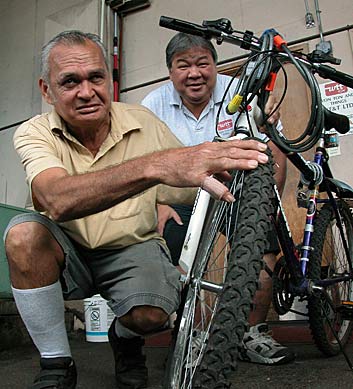
Rodney McFeeley, front, waited eight hours for an interpreter in the emergency room at Queen's Medical Center. The long wait didn't sit well with McFeeley's employer, Ronald Young, back.
Hardly heard
A deaf patient's eight-hour wait
points out gaps in hospital communications
Rodney McFeeley, 64, said he was "waiting and waiting and waiting and waiting" for a sign-language interpreter after he was in an accident and taken by ambulance to the Queen's Medical Center on Jan. 13.
In an interview through interpreter Kennedy Cooper, McFeeley said he did not ask for an interpreter in the emergency room because he "just assumed they knew what they were doing, that they called an interpreter."
The deaf man's experience angered McFeeley's employer, Ronald Young, owner of Won Ton and Things Ltd. on Sand Island, and has upset advocates and organizations for the deaf.
"He was there eight hours," Young said. "He didn't understand why he had to wait so long. For a deaf person, that's a long time if there is no communication."
Queen's spokeswoman Nancy Usui said the hospital's policy is to provide emergency interpreters for deaf and hearing-impaired patients if they request an interpreter or the doctor or clinician feels communication is an issue.
She said she could not discuss specifics of McFeeley's case because of the patients' privacy law, and that the hospital's patient relations office has tried without success to contact him.
Sign help with deaf
|
Baird does not believe it is a cost-savings issue, because she said Queen's hires interpreters every day for regular appointments with deaf patients. "I think it's an oversight," she said. "Doctors get so busy (in ERs)."
But the American with Disabilities Act calls for equal access to information, she said, adding that she knows of recent violations of the law.
Officials say more than 100,000 islanders statewide have significant hearing loss, and about 10,000 are deaf residents who use sign language as the primary method of communication.
Francine Wai, executive director of the Disability and Communication Access Board, said, "Clearly, the obligation of a hospital in providing services for people who are deaf and hard of hearing is to provide equivalent communication."
Communication does not always require an interpreter, but can be in writing or by a computer screen, she said.
McFeeley said he was "writing notes back and forth" with his nurses and doctors. But he prefers an interpreter because sometimes it is hard to understand what someone means with writing, he said.
Also, it was difficult for him to write because his right hand was injured, with 12 stitches needed on his little finger, he said. He also was treated for two cuts on his head and lacerations above his right eyebrow.
McFeeley collided with a car about 4:30 p.m. while riding his bicycle from Sand Island to Puuhale Street, where he catches the bus to go to his home in Waianae.
Young said a social worker called him from Queen's at about 10:30 p.m. looking for a relative who could communicate with McFeeley because they were trying to discharge him.
Young said he asked the social worker and others in the emergency room, before and after he went there to pick up McFeeley, why no one had called for an interpreter since 5 p.m. "It really concerns me that the hospital never bothered to get an interpreter," said Young, explaining that he only knows a limited form of sign language. "How would Rodney know what was happening to him?"
An emergency interpreter was reached through the Hawaii Services on Deafness and arrived about midnight from Waianae, he said. He and McFeeley left the hospital about 1 a.m., he said.
Kristine Pagano, advocate and treasurer for the Aloha State Association of the Deaf, said more education is needed for hospitals about care for patients with communication barriers.
Wai said health issues are involved as well as legal requirements. "A person must have informed consent when signing papers," she pointed out. "If a person is deaf and doesn't have appropriate literacy skills, as might a non-English-speaking person from another country, then writing down or even typing what is on a printed form doesn't provide any great communication."
Kathy Reimers, Hawaii Services on Deafness executive director, said her agency, which offers emergency interpretation services around the clock, has contracts with Queen's and other medical centers. "We know Queen's staff and legal personnel are aware of the laws and have set a system in place to ensure compliance.
"I don't know why there is a breakdown in the ER system," Reimers added, "but we're going to do training there and refresher training with all hospitals."
Although he was not happy about not having an interpreter, McFeeley said, "I really liked my doctor," who advised him to wear a helmet when riding bike.
"I've already bought it," he said.
[News] [Business] [Features] [Sports] [Editorial] [Do It Electric!]
[Classified Ads] [Search] [Subscribe] [Info] [Letter to Editor]
[Feedback]
